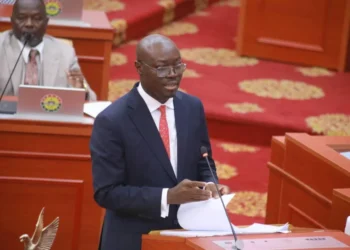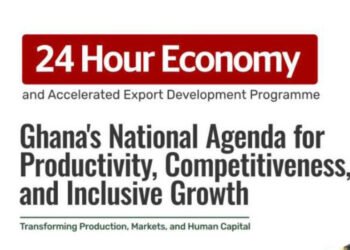Bank of Ghana’s latest forecast shows that inflation will likely peak in the first quarter of 2023, and ease to around 25 percent by the end of 2023.
This forecast is however, conditioned on the tightness of monetary policy and the deployment of tools to contain excess liquidity in the economy.
There are, however, upside risks to the outlook, emanating from the persistent upward adjustments in ex-pump petroleum products and transport fares with associated second-round effects on the pricing of goods and services, BoG warned.

“Additionally, the proposed VAT increase and currency pressures may exert upward pressures on headline inflation. Amid these concerns, however, it is expected that the continued tight monetary policy stance would moderate the spillover effects. Therefore, continued vigilance to the evolution of these potential price pressures in the outlook will be key.”
Bank of Ghana
Inflationary pressures remained heightened on account of the persistent upward adjustments in ex-pump petroleum prices and transport fares, together with increased utility tariffs and pass-through effects of continued currency depreciation.
The heightened inflation expectations, alongside rising production costs, and tightened external financing conditions are likely to further exert upward pressures on inflation, going forward. However, if these risk factors moderate in 2023, some base drift effects could instigate disinflationary trends.
Despite the strong performance of the Cedi in the final quarter of the year, inflationary pressures remain heightened as headline inflation now stands at 50.3 percent in November, 2022. This continued to weigh on private sector activity in the country.
Ghana Private Sector Activity Shrinks for 10th Month
The S&P Global Ghana PMI was 44.9 in November of 2022, up slightly from 44.0 in October but still pointing to a marked decline in the health of the private sector for the tenth consecutive month.
According to S&P Global, new orders, business activity and staff numbers fell further in November, although the rates of decline were softer than in the previous month.

“Currency weakness and steep inflationary pressures continued to hit demand. Meanwhile, purchasing activity also decreased amid declining demand and higher prices for inputs. On the price front, overall input costs increased rapidly and at a faster pace that was among the sharpest in the past eight years. In turn, selling price inflation hit a series-record high.”
S&P Global
The S&P Global stated that business sentiment remained muted in November, despite improving from the previous month, with hopes that prices will stabilize and economic conditions improve over the coming year.
Ghana’s economy went through difficult times this year, especially in the second half. Latest Bank of Ghana’s updated real Composite Index of Economic Activity (CIEA) contracted by 1.2 percent in September 2022, compared with a growth rate of 11.2 percent in the corresponding period of 2021.
Meanwhile, consumer and business confidence surveys conducted by BoG in October 2022 pointed to continued softening of economic sentiments. The Consumer Confidence Index dipped from 78.8 in August to 73.9 in October 2022 on account of rising inflation and uncertainty about future economic conditions.
The Business Confidence Index also declined from 77.4 in August to 72.6 in October 2022 on concerns about rising operational costs, sharp currency depreciation and weak consumer demand.























